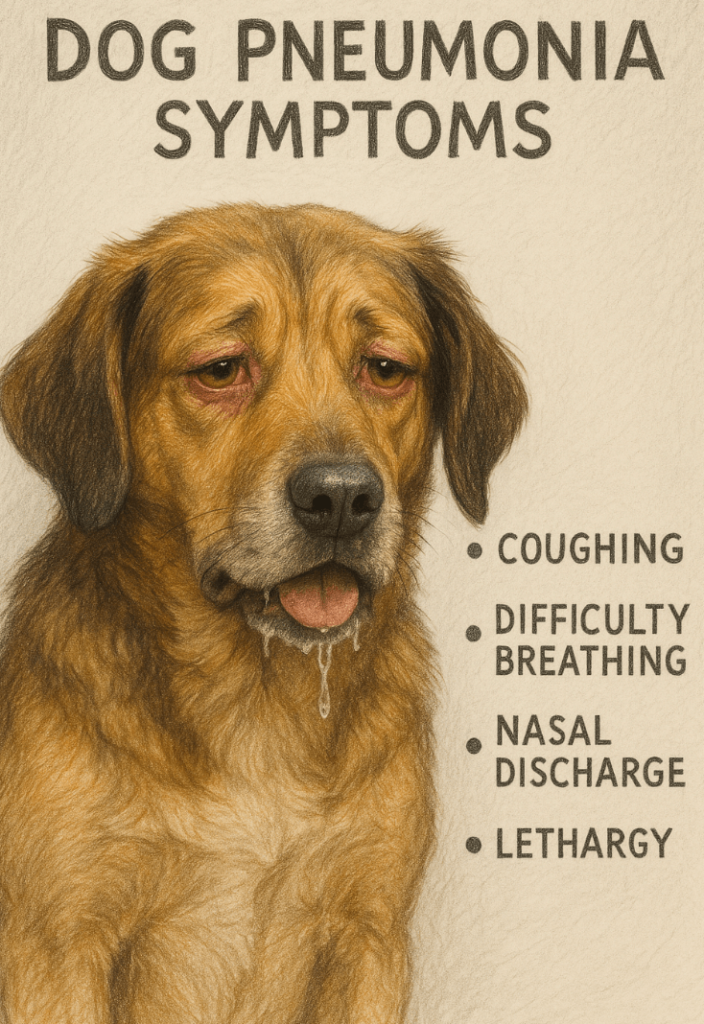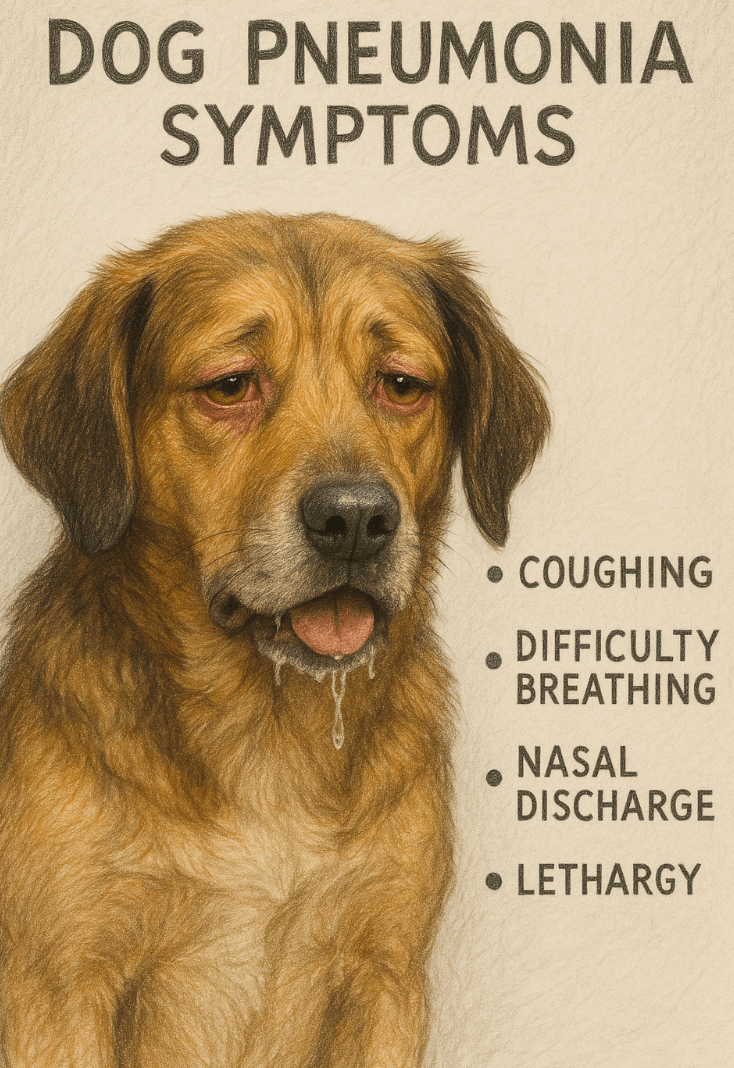Dog Pneumonia Symptoms: What Every Pet Owner Should Know
Pneumonia in dogs is a serious respiratory condition that requires prompt attention to ensure your furry friend’s health and well-being. While pneumonia can affect dogs of all ages and breeds, early recognition of symptoms is crucial for effective treatment and recovery. From coughing and lethargy to more subtle signs like loss of appetite, understanding the warning signals can make all the difference. In this blog post, we’ll explore everything you need to know about dog pneumonia symptoms, including how to identify them, what causes the condition, and steps to take if you suspect your dog is unwell. With the right knowledge, you can help your canine companion stay healthy and happy.
Common Symptoms of Dog Pneumonia
Recognizing the signs of pneumonia in dogs is the first step toward getting them the care they need. These symptoms may vary depending on the severity of the condition, but some are more common than others.
Persistent Coughing:
A dry, hacking cough or one that produces mucus is one of the most noticeable signs of pneumonia in dogs.Difficulty Breathing:
Labored or rapid breathing, often accompanied by wheezing or shallow breaths, indicates respiratory distress.Lethargy and Weakness:
Dogs with pneumonia may appear unusually tired, unwilling to engage in play or even basic activities.Fever:
An elevated body temperature (above 103°F) is a key indicator of infection and inflammation in the lungs.Loss of Appetite:
Many dogs with pneumonia lose interest in food due to discomfort or general malaise.
If you notice any combination of these symptoms, it’s essential to consult your veterinarian promptly for a proper diagnosis and treatment plan.
Types of Pneumonia in Dogs and Their Causes
Understanding the different types of pneumonia can help you better grasp why your dog might develop this condition. Each type has unique causes and risk factors.
Bacterial Pneumonia:
Caused by bacterial infections, this is the most common form of pneumonia in dogs and often results from inhaling harmful bacteria.Aspiration Pneumonia:
Occurs when foreign materials, such as vomit or food particles, enter the lungs, leading to inflammation and infection.Viral Pneumonia:
Triggered by viral infections like canine distemper, this type weakens the immune system and makes dogs more susceptible to secondary infections.Fungal Pneumonia:
Caused by inhaling fungal spores, this form is less common but can occur in dogs exposed to environments rich in fungi.Parasitic Pneumonia:
Certain parasites, such as lungworms, can cause pneumonia by infecting the respiratory system.
Knowing the type of pneumonia affecting your dog allows veterinarians to tailor treatments effectively.
Check this guide 👉Understanding Your Dogs Resting Respiratory Rate: Best 7 Tips
Check this guide 👉Understanding Heart Murmurs in Dogs: Best 7 Expert Tips!
Check this guide 👉Understanding Heart Murmur Medication for Dogs: Best 7 Tips!

Early Warning Signs of Pneumonia | Advanced Symptoms Requiring Immediate Care |
|---|---|
Persistent coughing | Severe difficulty breathing |
Mild lethargy | Bluish gums or tongue (sign of oxygen deprivation) |
Slight fever | Collapse or inability to stand |
Reduced appetite | Rapid weight loss |
Nasal discharge | Unconsciousness or seizures |
Steps to Take if You Suspect Dog Pneumonia
If you believe your dog may have pneumonia, acting quickly can significantly improve their chances of recovery. Here’s what you should do if you notice symptoms.
Monitor Your Dog’s Condition:
Keep track of their symptoms, noting when they began and whether they’re worsening over time.Contact Your Veterinarian:
Schedule an appointment immediately; your vet will likely perform a physical exam and diagnostic tests like X-rays or blood work.Keep Your Dog Comfortable:
Ensure they rest in a warm, quiet space away from drafts or extreme temperatures.Avoid Stressful Activities:
Limit exercise and excitement until your dog receives professional care to prevent further strain on their lungs.Follow Veterinary Advice:
Administer prescribed medications, such as antibiotics or anti-inflammatories, exactly as directed.
Taking these steps ensures your dog receives timely care while minimizing complications.
Preventive Measures to Reduce the Risk of Pneumonia
While not all cases of pneumonia are preventable, there are several measures you can take to reduce your dog’s risk of developing this condition.
Maintain Good Hygiene:
Regularly clean your dog’s living area and toys to minimize exposure to harmful bacteria or fungi.Vaccinate Against Respiratory Diseases:
Stay up-to-date on vaccinations, especially those targeting illnesses like kennel cough or distemper.Prevent Aspiration Risks:
Supervise mealtime closely, especially for dogs prone to eating too quickly or vomiting.Provide a Balanced Diet:
A strong immune system starts with proper nutrition; feed your dog high-quality food tailored to their needs.Regular Vet Check-Ups:
Routine examinations can catch underlying health issues before they escalate into pneumonia.
By implementing these preventive strategies, you can help safeguard your dog’s respiratory health.
Common Misconceptions About Dog Pneumonia
There are several myths surrounding dog pneumonia that can lead to confusion or delayed treatment. Clearing up these misconceptions ensures you’re better prepared to care for your pet.
“Only Sick or Elderly Dogs Get Pneumonia”:
While older or immunocompromised dogs are at higher risk, any dog can develop pneumonia regardless of age or health status.“Coughing Always Means Pneumonia”:
While coughing is a symptom, it can also result from allergies, kennel cough, or heart conditions—accurate diagnosis is essential.“Antibiotics Alone Cure All Types of Pneumonia”:
Treatment depends on the cause; fungal or viral pneumonia requires different approaches than bacterial cases.“Dogs Can’t Catch Pneumonia Indoors”:
Poor ventilation or exposure to mold indoors can increase the risk of fungal pneumonia.“Pneumonia Is Always Fatal”:
With prompt and appropriate treatment, most dogs recover fully, though severe cases may require intensive care.
Dispelling these myths helps pet owners make informed decisions about their dog’s health.
Home Remedies to Support Recovery (Under Vet Supervision)
While professional treatment is critical, certain home remedies can complement your dog’s recovery process under veterinary supervision.
Steam Therapy:
Letting your dog breathe in steam from a hot shower can loosen mucus and ease breathing.Hydration:
Encourage water intake to keep mucous membranes moist and support overall healing.Nutritious Meals:
Offer easily digestible foods like boiled chicken and rice to maintain energy levels during recovery.Quiet Environment:
Provide a calm, stress-free setting to promote rest and relaxation.Gentle Massage:
Lightly massaging your dog’s chest can help relieve tension and improve circulation.
These supportive measures enhance comfort but should never replace medical treatment.
When to Seek Emergency Care for Dog Pneumonia
Some symptoms of dog pneumonia warrant immediate emergency care to prevent life-threatening complications. Knowing when to act can save your dog’s life.
Bluish Gums or Tongue:
This indicates oxygen deprivation and requires urgent intervention.Inability to Stand or Walk:
Collapse or extreme weakness signals advanced respiratory distress.Severe Wheezing or Gasping for Air:
Struggling to breathe is a red flag that demands immediate attention.Sudden Loss of Consciousness:
Passing out or seizures require emergency veterinary care without delay.High Fever Exceeding 104°F:
Extremely high fevers can lead to organ damage if not treated promptly.
Acting swiftly in these situations ensures your dog receives the critical care they need.
Frequently Asked Questions About Dog Pneumonia Symptoms
What should I do if my dog is coughing constantly?
Persistent coughing could indicate pneumonia; consult your vet for a thorough evaluation.
Can puppies get pneumonia?
Yes, puppies are more vulnerable due to weaker immune systems, so monitor them closely.
Is pneumonia contagious between dogs?
Some forms, like bacterial or viral pneumonia, can spread to other dogs, especially in close quarters.
How long does it take for a dog to recover from pneumonia?
Recovery times vary but typically range from a few weeks to a couple of months, depending on the severity.
Can I give my dog over-the-counter medicine for pneumonia?
No, never administer human medications without veterinary approval, as they can worsen the condition.
Staying Vigilant for Your Dog’s Health
Pneumonia in dogs is a serious condition that demands swift action and careful management. By familiarizing yourself with the symptoms, understanding potential causes, and taking preventive measures, you can protect your furry friend from unnecessary suffering. Remember, early detection and veterinary care are key to ensuring a full recovery. With love, attention, and proactive health practices, you can help your dog lead a long, happy, and pneumonia-free life.
Do Cats Have Taste Buds? Best 7 Expert Tips! – Discover how cats experience flavors and why their taste is so unique.
Do Dogs Have Taste Buds? Best 7 Expert Tips! – Discover how dogs experience taste, their preferences, and what it means for their diet and health.
Can Cats Taste Sweet? Best 7 Expert Tips! – Discover why cats can’t taste sweetness, how it affects their diet, and tips to keep them healthy and happy.
Can Dogs Taste Sweet? Best 7 Expert Tips! – Discover how dogs perceive sweetness, which foods are safe, and tips to manage their sweet cravings responsibly.





